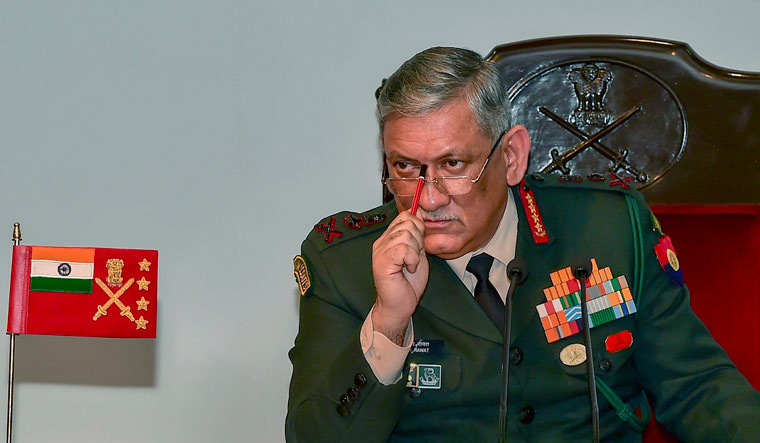Taking a contradictory view on India's official policy on engagement with Taliban, Army Chief General Bipin Rawat says that if several countries have started talking to the Taliban then "we should also join the bandwagon" as India also has an interest in developments in neighbouring Afghanistan.
Taking forward from his opinion, which he expressed on Wednesday during Raisina Dialogue in New Delhi, General Rawat said: "Does India have an interest in Afghanistan? If the answer is 'yes', then we can’t be out of the bandwagon."
"Our thinking is that yes we have interest in Afghanistan. If we have an interest and other people want to talk to Taliban, then shouldn't we in some way be involved, either directly or indirectly? We should not be left out,” Gen Rawat told reporters ahead of the Army Day.
New Delhi has always maintained a distance from Taliban. But, in November last, South Block made an half-hearted attempt by participating in the Moscow talks on Afghanistan, in which a delegation from Taliban had also come. Two former diplomats were sent there, but only as observers.
"There is a country, and some countries have decided to talk to the Taliban in their wisdom… In Afghanistan things have improved… In some areas development has happened. So there is a people’s voice that is emerging that we want peace. Therefore what has been decided by some of the nations is that 'let's start talking to the Taliban and see if they can also be brought into a system of governance and if there can be lasting peace there'," Army chief said while adding that "Unless you are not sitting on that table, you will not know what is discussed. Because a lot of this is discussed in closed doors. That’s why we are saying, sit on the high table, and see how it suits you".
The Army chief also said that India should not take the lead as there are so many countries there. "Let’s at least know what is happening. We have our issues. I think we need to take our call on our own terms but unless you are sitting on the high table how do you know what is happening?"
In response to an argument that the same principle of talks can be applied to Jammu and Kashmir, the Army Chief clarified that the same analogy cannot be applied here. "It is a bilateral issue between two nations. There is no place for third party intervention. If we talk, we should talk on our terms and conditions. Our terms and conditions are very clear".
“Come to the negotiation table and let's start talking. But give up violence, stop taking support from the Western neighbour," Army chief said without naming Pakistan.
Reacting sharply to the Army chief's comment on talks with Taliban, former Jammu and Kashmir chief ministers Omar Abdullah and Mehbooba Mufti demanded similar approach towards J&K.
On situation in Kashmir valley, the Army chief maintained that the security forces are gradually moving towards bringing the situation under “better control” by adopting a policy of “hard and soft approach”. He said the men in uniform are “facilitators” of peace in the valley.
The General also touched upon the modernisation of infantry as his "priority". He said new assault rifles will arrive this year and northern command will soon get new sniper rifles by the end of this month.
On adultery and LGBT
Taking a strong position on the recent Supreme Court verdict decriminalizing the adultery law, the Rawat said that the Army is very conservative.
''Gentlemen, the Army is conservative. I will tell you. We are not modernised. Neither are we westernised. We are conservative.''
Speaking on the LGBT issue, he expressed a similar opinion. ''Same thing about the LGBT issue. In the Army, these are not acceptable. We will still be dealing with them under various sections of the Army act."
''We are certainly not above the country's law. But in the Indian Army, when you join, some of the rights and privileges authorised to you under the Constitution are not authorised to me (armyman). So there are some issues where we are different. We are different because some things have been made different for us. But we are certainly not above the Supreme Court."



